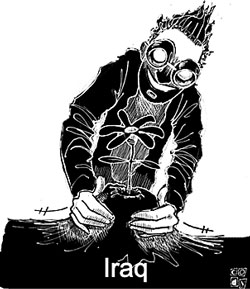
Illustration by Cody Angell
|
By Caitlin Hall
Arizona Daily Wildcat
Thursday April 3, 2003
The time has come to move on, or so we're told. At every available opportunity, salivating reporters soak up and spit out ÷ with a cautionary word or two ÷ the official dictums of the State Department and the Department of Defense, the two of which have become alarmingly indistinguishable over the past few months.
We ÷ the American people, especially those who don't support the war ÷ are told that the time for protest is over. Many swallow it, proving that they didn't quite get the point in the first place. Preemptive protest was a new peace tactic, to confront a new war tactic: preemptive attack. Protest, however, is not something that ends when the thing protested begins; that's where it rightfully starts.
Let's assume, however, that this oft-repeated, little-weighed rationale ÷ "it's wrong to protest, this is war" ÷ actually holds water. That is, let's do what we're being told to do: move on. Let's move right on to the end of the war, when the world finally gets to see if George Bush and his cronies are the righteous liberators they fashion themselves or just a bunch of cowboys blowing hot air.
We don't have to wait six months, though, or even six weeks; as the front advances across Iraq, so too does the end of the war. The way the "liberated" south is being handled gives us some clues as to the way the larger scheme will play out.
There are, first of all, a number of goals that must be met before anyone can reasonably believe the war effort to have been a success: Iraq must be politically sovereign, economically self-sufficient, free of weapons of mass destruction, internally stable and equipped with the basic infrastructure to function without being heavily dependent on foreign aid.
Let's start at the end of the list: infrastructure. As part of its propaganda war, the U.S. has destroyed communication centers throughout Iraq ÷ first television, then telephone and the Internet ÷ severely hampering the dissemination of emergency information. Food and water are in dangerously short supply.
If the first Gulf War is any indication, as the fighting intensifies waste treatment facilities will be the next to go, leaving the country in squalid, disease-ravaged conditions. There's no need to delve into potentialities, though; the realized hypotheticals are frightening enough.
Despite Bush's assertion that the outcome of the war will stabilize Iraq, there is already some indication that the ethnic struggle long feared by analysts might come to fruition. At our provocation, the northern Kurds are rattling their sabers, eager to be severed once and for all from Sunni-ruled Iraq. The Turks are ready to invade rather than see that happen, even at the risk of losing a $1 billion U.S. aid package closely linked to their cooperation.
Thus far, we have no reason to suspect Iraq will have any trouble ridding itself of weapons of mass destruction ÷ because we still have no indication, outside of a couple discarded Gulf War-issue chemical suits, that Iraq had them pre-invasion. If we fail to discover such weapons, God help us. The world's wrath will make the diplomatic scuffle at the U.N. seem like a walk in the park. We will be positively lynched in the court of public opinion, and our undue hawkishness will become a clarion call for future generations of terrorists.
Next, Iraq must be financially autonomous ÷ a goal that the administration has insisted will be met with the aid of oil revenues. The news on this front has not been encouraging, either. Despite pre-invasion assurances that the profits of the oil trade would fall solely to Iraqi citizens, so far the polar opposite has been the case.
Companies with strong ties to the White House have been given preferential treatment as they vie for huge slices of a $1.9 billion restructuring contract. All of the companies considered for contracts contributed substantially to Bush's presidential campaign. In open mockery of ethical scruples, a subsidiary of Halliburton, where Vice President Cheney was CEO from 1995 to 2000, was awarded the contract to extinguish oil well fires in Iraq just before it was to file for bankruptcy.
Finally, Iraq must be a sovereign, self-sufficient nation. One would think, given the administration's rhetoric about bringing democracy to an oppressed land, that it would at least be concerned with maintaining the appearance of self-determination. Not so. The U.S. plan for the post-war government in Iraq, reported Tuesday in the British Guardian ÷ and ignored by the American press ÷ calls for an interim government made up of 23 ministries, each to be headed by an American.
One is left to wonder, given the chaotic and shortsighted manner in which development of post-war Iraq is being orchestrated, whether the administration has the best interests of the Iraqi people in mind, let alone at heart. We must realize that if we simply obey orders to keep quiet while the war is going on, we are acquiescing to a future for Iraq that is far from acceptable, and far from what we've been led to expect. The Iraqi people, and we ourselves, deserve more.

